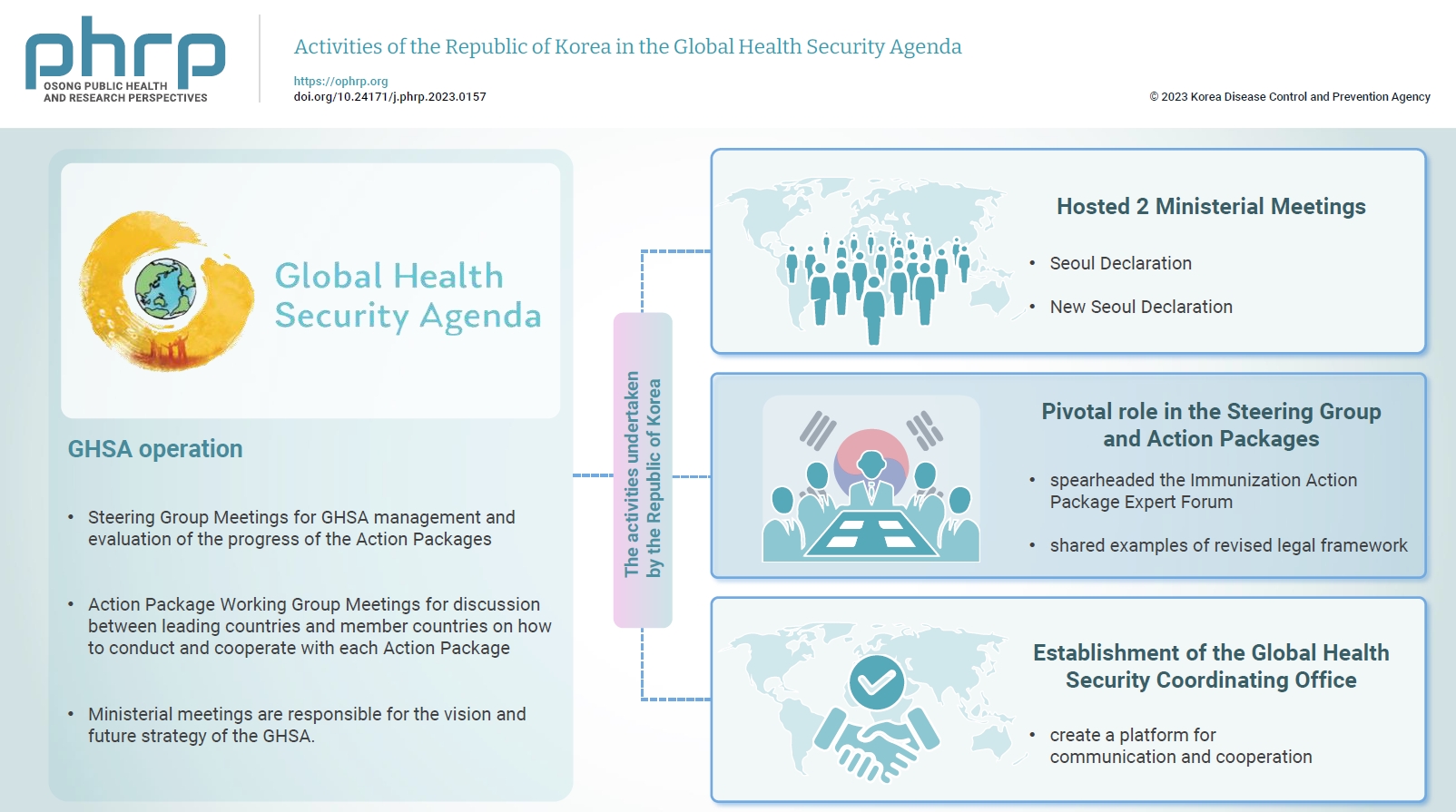Articles
- Page Path
- HOME > Osong Public Health Res Perspect > Volume 15(1); 2024 > Article
-
Commentary
Activities of the Republic of Korea in the Global Health Security Agenda -
Gang Lip Kim1
 , Sookhyun Lee1,2
, Sookhyun Lee1,2 , So Yoon Kim1
, So Yoon Kim1
-
Osong Public Health and Research Perspectives 2024;15(1):90-93.
DOI: https://doi.org/10.24171/j.phrp.2023.0157
Published online: February 19, 2024
1Asian Institute for Bioethics and Health Law, Yonsei University, Seoul, Republic of Korea
2GNPSP (Global Network for Peace and Sustainable Progress), Seoul, Republic of Korea
- Corresponding author: Sookhyun Lee Asian Institute for Bioethics and Health Law, Yonsei University, 50 Yonsei-ro, Seodaemun-gu, Seoul 03722, Republic of Korea E-mail: leetnrgus@gmail.com
© 2024 Korea Disease Control and Prevention Agency.
This is an open access article under the CC BY-NC-ND license (http://creativecommons.org/licenses/by-nc-nd/4.0/).
- 590 Views
- 143 Download
- • The Republic of Korea has achieved remarkable results between 2014 and 2023; it created the Seoul Declaration in 2015 and the New Seoul Declaration in 2022, hosted 2 Ministerial Meetings and played pivotal roles in the Steering Group and Action Packages to lead to the Immunization Action Package and to share the legal preparedness cases from Middle East respiratory syndrome to COVID-19 in the Legal Preparedness Action Package. Also, it has spearheaded the establishment of the Global Health Security Coordinating Office in Seoul as a platform of communication and cooperation with the Global Health Security Agenda members.
HIGHLIGHTS
-
Ethics Approval
Not applicable.
-
Conflicts of Interest
The authors have no conflicts of interest to declare.
-
Funding
None.
-
Availability of Data
The datasets are not publicly available but are available from the corresponding author upon reasonable request.
-
Authors’ Contributions
Conceptualization: SL; Data curation: SL; Formal analysis: GLK; Investigation: SL; Methodology: SL; Project administration: SYK; Resources: SL; Software: SL; Supervision: SYK; Validation: GLK; Writing–original draft: SL; Writing–review & editing: all authors. All authors read and approved the final manuscript.
Article information
- 1. Kim SY. Global Health Security Agenda white paper: 2014-2018 [Internet]. The Ministry of Health; 2018 [cited 2023 Sep 25]. Available from: https://www.nl.go.kr/NL/contents/search.do?srchTarget=total&pageNum=1&pageSize=10&insiteschStr=&schQuery=&mainSrchField=1&kwd=글로벌보건안보구상+백서#viewKey=738017278&viewType=AH1&category=도서&pageIdx=1&jourId=. Korean.
- 2. Global Health Security Agenda (GHSA). Global Health Security Agenda [Internet]. GHSA; 2019 [cited 2023 Sep 25]. Available from: https://globalhealthsecurityagenda.org/.
- 3. World Health Organization (WHO). Joint external evaluation of IHR core capacities of the Republic of Korea [Internet]. WHO; 2018 [cited 2023 Sep 25]. Available from: https://www.who.int/publications/i/item/WHO-WHE-CPI-2017.65.
References
Figure & Data
References
Citations




 Cite
Cite

